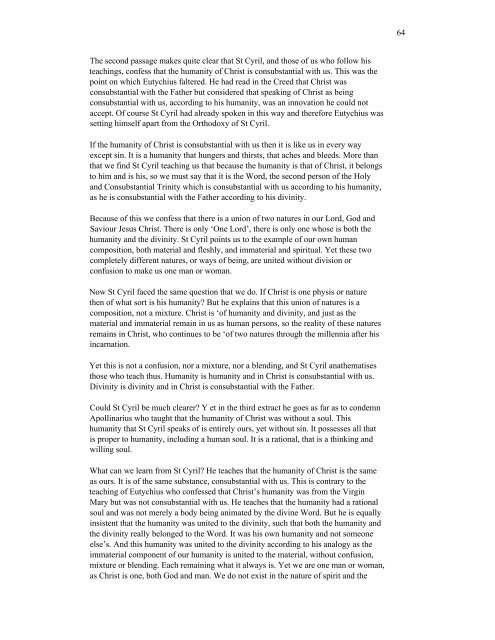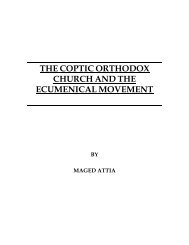Coptic interpretations of the Fourth Ecumenical Council - Saint Mina ...
Coptic interpretations of the Fourth Ecumenical Council - Saint Mina ...
Coptic interpretations of the Fourth Ecumenical Council - Saint Mina ...
Create successful ePaper yourself
Turn your PDF publications into a flip-book with our unique Google optimized e-Paper software.
The second passage makes quite clear that St Cyril, and those <strong>of</strong> us who follow his<br />
teachings, confess that <strong>the</strong> humanity <strong>of</strong> Christ is consubstantial with us. This was <strong>the</strong><br />
point on which Eutychius faltered. He had read in <strong>the</strong> Creed that Christ was<br />
consubstantial with <strong>the</strong> Fa<strong>the</strong>r but considered that speaking <strong>of</strong> Christ as being<br />
consubstantial with us, according to his humanity, was an innovation he could not<br />
accept. Of course St Cyril had already spoken in this way and <strong>the</strong>refore Eutychius was<br />
setting himself apart from <strong>the</strong> Orthodoxy <strong>of</strong> St Cyril.<br />
If <strong>the</strong> humanity <strong>of</strong> Christ is consubstantial with us <strong>the</strong>n it is like us in every way<br />
except sin. It is a humanity that hungers and thirsts, that aches and bleeds. More than<br />
that we find St Cyril teaching us that because <strong>the</strong> humanity is that <strong>of</strong> Christ, it belongs<br />
to him and is his, so we must say that it is <strong>the</strong> Word, <strong>the</strong> second person <strong>of</strong> <strong>the</strong> Holy<br />
and Consubstantial Trinity which is consubstantial with us according to his humanity,<br />
as he is consubstantial with <strong>the</strong> Fa<strong>the</strong>r according to his divinity.<br />
Because <strong>of</strong> this we confess that <strong>the</strong>re is a union <strong>of</strong> two natures in our Lord, God and<br />
Saviour Jesus Christ. There is only ‘One Lord’, <strong>the</strong>re is only one whose is both <strong>the</strong><br />
humanity and <strong>the</strong> divinity. St Cyril points us to <strong>the</strong> example <strong>of</strong> our own human<br />
composition, both material and fleshly, and immaterial and spiritual. Yet <strong>the</strong>se two<br />
completely different natures, or ways <strong>of</strong> being, are united without division or<br />
confusion to make us one man or woman.<br />
Now St Cyril faced <strong>the</strong> same question that we do. If Christ is one physis or nature<br />
<strong>the</strong>n <strong>of</strong> what sort is his humanity? But he explains that this union <strong>of</strong> natures is a<br />
composition, not a mixture. Christ is ‘<strong>of</strong> humanity and divinity, and just as <strong>the</strong><br />
material and immaterial remain in us as human persons, so <strong>the</strong> reality <strong>of</strong> <strong>the</strong>se natures<br />
remains in Christ, who continues to be ‘<strong>of</strong> two natures through <strong>the</strong> millennia after his<br />
incarnation.<br />
Yet this is not a confusion, nor a mixture, nor a blending, and St Cyril ana<strong>the</strong>matises<br />
those who teach thus. Humanity is humanity and in Christ is consubstantial with us.<br />
Divinity is divinity and in Christ is consubstantial with <strong>the</strong> Fa<strong>the</strong>r.<br />
Could St Cyril be much clearer? Y et in <strong>the</strong> third extract he goes as far as to condemn<br />
Apollinarius who taught that <strong>the</strong> humanity <strong>of</strong> Christ was without a soul. This<br />
humanity that St Cyril speaks <strong>of</strong> is entirely ours, yet without sin. It possesses all that<br />
is proper to humanity, including a human soul. It is a rational, that is a thinking and<br />
willing soul.<br />
What can we learn from St Cyril? He teaches that <strong>the</strong> humanity <strong>of</strong> Christ is <strong>the</strong> same<br />
as ours. It is <strong>of</strong> <strong>the</strong> same substance, consubstantial with us. This is contrary to <strong>the</strong><br />
teaching <strong>of</strong> Eutychius who confessed that Christ’s humanity was from <strong>the</strong> Virgin<br />
Mary but was not consubstantial with us. He teaches that <strong>the</strong> humanity had a rational<br />
soul and was not merely a body being animated by <strong>the</strong> divine Word. But he is equally<br />
insistent that <strong>the</strong> humanity was united to <strong>the</strong> divinity, such that both <strong>the</strong> humanity and<br />
<strong>the</strong> divinity really belonged to <strong>the</strong> Word. It was his own humanity and not someone<br />
else’s. And this humanity was united to <strong>the</strong> divinity according to his analogy as <strong>the</strong><br />
immaterial component <strong>of</strong> our humanity is united to <strong>the</strong> material, without confusion,<br />
mixture or blending. Each remaining what it always is. Yet we are one man or woman,<br />
as Christ is one, both God and man. We do not exist in <strong>the</strong> nature <strong>of</strong> spirit and <strong>the</strong><br />
64








